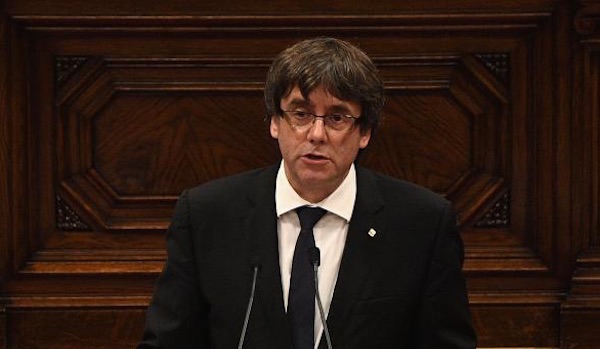
Members of the Catalan parliament have signed a declaration of independence from Spain but have agreed to suspend its implementation pending talks with the Madrid government.
President Carles Puigdemont was the first to sign the Declaration of the Representatives of Catalonia in the regional parliament in Barcelona.
The signing ceremony came a few hours after Mr Puigdemont addressed the parliament, saying Catalans had earned the right to independence from Spain after a referendum. Efforts by the Madrid authorities to suppress the vote on October 1 failed as violence and brutality by military police were peacefully defied with bravery and determination by millions of Catalan voters. The result showed 90% in favour of independence.
The central government in Spain responded by saying it did not consider the referendum or its results to be valid. It has also rejected the declaration of independence, threatening to arrest Catalan leaders and even hinting at their possible execution.
Mr Puigdemont said the landslide victory in the referendum gave his government the grounds to implement its long desire to break with Spain.
However, he proposed the national parliament “suspend the effects of the independence declaration to commence a dialogue, not only for reducing tension but for reaching an accord on a solution to go forward with the demands of the Catalan people”.
“We have to listen to the voices that have asked us to give a chance for dialogue with the Spanish state,” Mr Puigdemont said, indicating it could take a few weeks.
Such a move would help reduce political tensions and reach “an accord on a solution to go forward with the demands of the Catalan people”, Mr Puigdemont added.
Despite the state violence, Mr Puigdemont said Catalans have nothing against Spain or Spaniards, and that they want to understand each other better.
“We are not criminals, we are not crazy, we are not pulling off a coup, we are not out of our minds. We are normal people who want to vote,” he said.
In a critical speech that was delayed for about 90 minutes, Puigdemont said that Catalans had long wanted to vote on statehood but were thwarted by Spain.
“We tried for dialogue 18 times with the Spanish government, we tried to have a referendum, just like the Scottish did. We tried to do it,” he said.
There has been strong support from both Scotland and Ireland, although the main conservative and unionist parties in both countries have expressed opposition.
‘LEADERSHIP NEEDED’
Sinn Fein’s Gerry Adams said leadership was “urgently needed” in the crisis.
“Leadership from the Spanish state and leadership from the government of Catalonia - but also critically from the international community, especially the European Union,” he said.
A statement by the European Commission offered full support for the Madrid government and “proportionate use of force”, which it said was “necessary” to “uphold the rule of law”.
Mr Adams rejected this. “Any refusal by the international community to get involved - hiding behind the argument that this is an internal matter for Spain - puts at risk the possibility of reaching a peaceful solution to this very complex situation,” he said.
He suggested that the Irish peace process could become a template for Catalonia. He said that while no two disputes are the same, the broad principles to address and resolve differences are “very similar” and “can be adapted”.
“Twenty years after the Good Friday Agreement, we are still trying to implement elements of that and subsequent agreements,” he said. “But, critically, there is no conflict, and no suggestion that there will be a return to conflict.”
‘DENIED FREEDOM’
But the 1916 Societies, which has criticised the Irish peace process, described the events in Catalonia as “a reminder of our own situation in Ireland”.
“The British government’s sovereign claim here denies the fundamental right of our people to national self-determination,” it said.
“Catalonia and Ireland, as all nations and peoples, have a shared right to peace, democracy and ultimately to freedom. We look forward to the day, yet to come, where we both of us enter into the great commonwealth of nations, standing together as free peoples before the world.
“To echo The 1916 Proclamation, it remains our right, shared with the Catalans, to unfettered control of our nation and its destinies, a right held by that same Proclamation to be sovereign and indefeasible. In both Catalonia and Ireland, it remains the case.”
In a statement, the President of Republican Sinn Fein, Des Dalton welcomed the “overwhelming vote” in Catalonia for independence.
“The Catalan people defied the brutality of the Spanish state and gave witness to the world of their will for national sovereignty,” he said.
“The Spanish state attempted to subvert this national expression of the Catalan people’s demand for national freedom with the approval of the EU, illustrating once again that the EU is a bastion of the old imperialist states.
“The 26-County Administration shamefully also lent its support to the Spanish state by declaring that it would refuse to recognise the democratically expressed wishes of the Catalonian people.
“These are the same people who claim historic lineage from the First Dail Eireann, which adopted Ireland’s Declaration of Independence on January 21 1919 and sought recognition for the Irish Republic from the other free nations of the world.
“A century later the 26-County State in contrast lines itself up alongside the the old imperial powers of Europe in order to deny the Catalonian people their right to nationhood. They have shamed themselves and do not speak for the Irish people or their historical experience of breaking the chains of colonial rule. They should be reminded of this when they brazenly attempt to hijack the centenaries of the 1918 General Election and the First Dail Eireann in next year and in 2019 respectively.”
![[Irish Republican News]](https://republican-news.org/graphics/title_gifs/rn.gif)
![[Irish Republican News]](https://republican-news.org/graphics/title_gifs/harp.gif)

